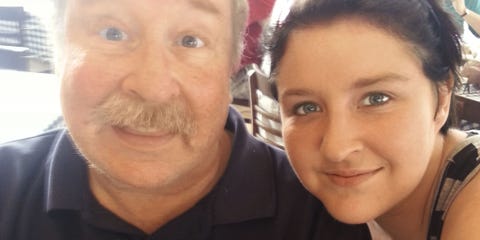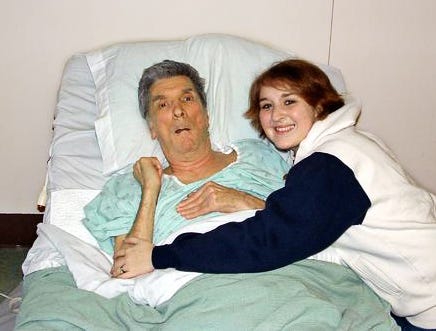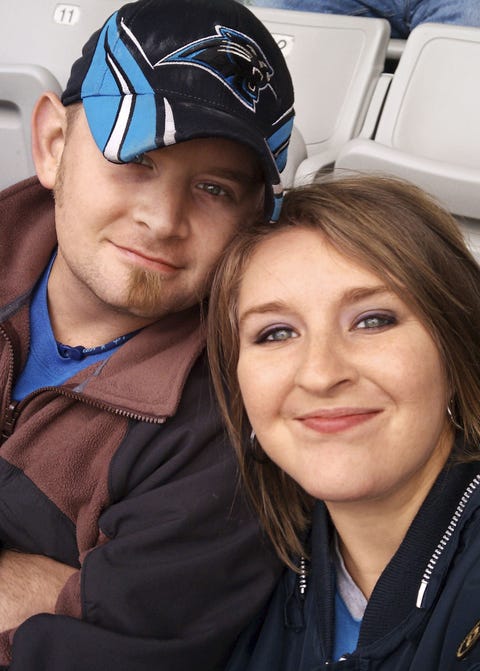How a Genetic Test Changed My Life
As a teen, Lauren Holder learned that a cruel and fatal disease was stalking her family — and that she might have inherited the gene for it from her dad. Now 30, she shares her journey to discover the truth.
BY LAUREN HOLDER AS TOLD TO VIRGINIA SOLE-SMITHDec 19, 2015 COURTESY OF LAUREN HOLDER
COURTESY OF LAUREN HOLDER
When I was 5, my grandpa Rose took my dad and me out on his boat off the coast of Florida, where we live. It was a hot, bright day, and as the boat skimmed over the water, I asked my dad to put up the sunshade so we could cool off.
It was a small request, but Grandpa Rose exploded in rage: “No! We’re not doing that!” Then he began to curse. I was shocked, but my dad wasn’t. As I would soon find out, violent outbursts were the norm for Grandpa Rose and had been for some time. His reputation as a cruel abuser was no secret in our family.
And then, 10 years later, Grandpa Rose became someone else entirely to me. That was the day my aunt told me he had Huntington’s disease (HD).
MORE FROM GOOD HOUSEKEEPING
How To Knit Stitch
Previous VideoPlayNext VideoUnmuteCurrent Time 0:34Loaded: 63.76%Remaining Time -1:57CaptionsFullscreen
Fear Sets In
Until I was 15, I had never heard of HD, a neurodegenerative disorder that is like Alzheimer’s disease, Parkinson’s disease, bipolar disorder, and Tourette’s syndrome rolled into one. But my aunt Amy told me what it was and explained that all of Grandpa Rose’s behavior — his temper, slurred speech (which we had wrongly thought indicated a drinking problem) and recent difficulty swallowing — had been symptoms. The disease would worsen, Amy said; near the end, he would be trapped inside a stiff body, unable to eat, talk, or move. The scariest part: HD is inher- ited. There was a 50/50 chance my father had it, and if he did, I faced the same odds.
Upon hearing the diagnosis, my grandpa, in total denial, jumped in his car, drove across the country and never came back. My family was actually relieved — his being so far away made it easier to avoid thinking about the situation. My dad didn’t seem to take the news seriously. “Just chain me up in the backyard with a drink, and I’ll be fine!” he joked about the possibility of developing HD, but inside, he must have been terrified. My grandpa was the meanest person I knew. Now there was a chance that my dad could turn into that kind of monster … and that I could, too.
Then, around the time I turned 18, I was chatting with my dad in our kitchen when he suddenly started screaming in anger and squeezing my arm hard enough to leave bruises. We didn’t talk about it, but I know we were worried about the same thing: He might be getting HD, too.
Learning My Fate
As soon as Grandpa Rose was diagnosed, when I was still in high school, I flung myself into researching HD. One of the first things I learned was that the same blood test that had found HD in him could tell me whether I would get it. When my dad began showing symptoms a few years later, he wasn’t interested in the test for himself, but I decided to get tested as soon as possible.
The genetic counselor I found wasn’t as supportive as I had hoped. “If you have the genetic mutation for Huntington’s, there’s nothing we can do,” she told me. “There is no medical benefit [to knowing].” I understood, but I also knew that without the test result, I would obsess over whether, when, and how I might get sick. Testing would put the biggest piece of the puzzle in place.
After the blood draw, the wait for the results felt endless. I kept asking myself the same questions: What would a positive result mean for me and my dad? Would I hurt those I loved like Grandpa Rose had? Would my husband, Josh, whom I’d wed at 19, leave me?
When the day finally arrived, the counselor didn’t make us wait. As we walked into her office, she said it: “You tested positive. You are going to get Huntington’s disease.”
When I heard the news, I burst into tears — of sadness, but also of relief, because I wasn’t wondering anymore. But as we began to talk, fear settled in. It’s surreal to have someone tell you how you’re going to die.
Adjusting to my new reality over the next few days, weeks, and months wasn’t easy. I developed insomnia, had anxiety attacks, and got very depressed. Any time I got mad or acted clumsy, I would freak out and think, This is it. It was also difficult to deal with my parents: Though my dad’s angry outbursts continued, neither of them had accepted that HD was the cause. Talking to my mom about it was like talking to the air.
Still, I was determined that my test results should help someone. I knew my grandpa Rose, then 73, was in a nursing home in Seattle, so I flew out to see him. At first glance, I couldn’t tell if he was alive; he’d lost so much weight, and his body had become stiff. That night, I cried myself to sleep.
But the next day I forced myself to visit again, bringing family photos. Though he hadn’t been out of bed in six months, I asked him, “Do you want to get up and sit with me?” It took a few minutes for him to get a word out, but when he did, he said yes, and so we sat and looked through the pictures. When it was time to leave, I said, “I love you.” For the first time in my life, Grandpa Rose told me, “I love you, too.”
 Lauren reconnecting with her grandpa Rose before he died in 2007.COURTESY OF LAUREN HOLDER
Lauren reconnecting with her grandpa Rose before he died in 2007.COURTESY OF LAUREN HOLDER
When I got home, I sent my dad pictures of the trip, and days later he and his sisters flew to see their father. Grandpa Rose died just months later. I’m forever grateful that we all made peace and said goodbye.
Ready to Live
It’s been 10 years since I got my results, and I’m still presymptomatic. My doctors think that will change when I’m in my mid-40s.
There have been times when I’ve tried to push Josh away, to protect him. But he always says, “We’re in this together.” Still, I know he wishes we could have kids as badly as I do. But I don’t want to pass this gene to a child, nor would I want a child to have to take care of me at a young age.
But whenever I think Poor me, I remember my dad. Three years ago, he said, “Lauren, I looked up Huntington’s disease. I think I have it.” I realized that it had taken me facing my truth for my dad to accept his. Soon afterward, he joined me in volunteering with the Huntington’s Disease Society of America.
At 57, my dad has little short-term memory; by noon, he can’t tell you what he ate for breakfast. He walks slowly, has poor balance, suffers from mood swings, and has other health problems, like complications from diabetes, that disorient him. But there are good moments, too, when I know he’s still Dad. If my mom gets flustered, he’ll tease her by saying, “Oh, no — you caught my Huntington’s!” And we laugh, because no one is living in denial anymore. We’re all determined to get as much as we can out of life. We are living with Huntington’s disease, but that doesn’t mean we can’t live.
 Lauren at a football game with husband Josh in 2014.COURTESY OF LAUREN HOLDER
Lauren at a football game with husband Josh in 2014.COURTESY OF LAUREN HOLDER
The 411 on Huntington’s Disease
What Is It?
Huntington’s disease is an incurable inherited brain disorder that results in the progressive loss of mental faculties and physical control. Signs usually appear between ages 30 and 50 and worsen slowly over the next 10 to 25 years.
Who’s At Risk?
You can develop the disease only if one of your parents has the mutated HD gene and you inherit it. It’s estimated that one in 10,000 Americans has HD, and more than 250,000 others are at risk of having inherited the gene.
Is There Hope?
Research has yet to find a means of slowing the deadly progression of HD, but last year scientists launched the first clinical trials to study the safety of a drug designed to silence the gene. For more information, visit hdsa.org.
This story originally appeared in the January 2016 issue of Good Housekeeping.
Essay
Assignment Sheet
Would You Want to Know Your Future?
Please follow this assignment sheet carefully as you construct you first
formal essay for the course.
Paragraph 1:
Begin your paragraph with a HOOK or ATTENTION GETTER
that
leads the reader into the essay.
Use a question, quote, shocking fact, or small piece of narrative (story-
telling) to attract readers interest and make them want to read your essay.
(1-3 sentences)
Next, give a SUMMARY of the documentary “The Lion’s Mouth
Opens,” giving credit to the director, Lucy Walker.
In the first sentence of your summary, give the title of the documentary,
the director’s full name, and the main idea. After that, give the main
supporting ideas from the documentary in your own words. Leave out
minor or inessential details. Do not indicate your opinion in the
summary. Do not quote in the summary. (3-8 sentences)
End the paragraph with a THESIS that directly answers the prompt
question,
“If one of your parents had the disease, would you take the
genetic test for Huntington’s Disease?”
Paragraphs 2,3, and 4
: These are supporting paragraphs in which you
will back up your thesis with logic and evidence.
1: Each paragraph should begin with a topic sentence. The topic
sentence should give one reason for your thesis. Everything in the
paragraph should be about the idea in the topic sentence. If it is about a
different idea, it should go in another paragraph or another essay.
2: Use logic to explain your reasoning for the topic sentence. (2-4
sentences)
3: Use evidence to back up your topic sentence. This may be a
quote or paraphrase from the documentary or one of the articles on
Canvas. It may be an example from your own life or experiences. It
may be a hypothetical example. (1-3 sentences)
4: Interpret the evidence. Explain to readers what that evidence
shows and how it connects to your topic sentence. (1-3 sentences)
5: Conclusion/Transition Sentence. Finally, use one sentence to
wrap up this paragraph’s idea and lead readers on to the next paragraph.
(1 sentence)
Paragraph 5
: The conclusion paragraph.
1: First, restate your thesis and topic sentences in different words.
(3-5 sentences)
2: Finally, find some way to lead readers out of your essay, using
one of the hook techniques above or a call to action.
You
MUST
use at least two sources (including the documentary) in this
essay.
You
MUST
quote word for word at least twice in the essay. You
CAN
NOT
quote more than once in a paragraph, although you may
paraphrase as many times as you can make work in the paragraph.
Formatting: All essays must be typed and double-spaced using Times
New Roman 12 point font.
At the top left of the first page there should be a header containing the
following information:
.



